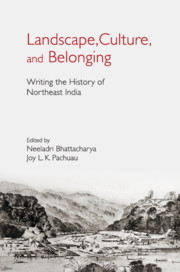Book contents
- Frontmatter
- Contents
- List of Figures
- Acknowledgements
- Introduction
- I Borders and Beyond
- II Surveys and Explorations
- III Ethnography, History, and the Politics of Representation
- IV Law, State, and Practices of Governance
- V Cultural Dialogues
- 11 Appropriating the Ao Past in the Christian Present
- 12 Why Do People Convert? Understanding Conversions to Christianity in Mizoram
- 13 From Sacred Rocks to Temples: Recasting Religion as Identity in Northeast India
- Notes on Contributors
- Index
11 - Appropriating the Ao Past in the Christian Present
from V - Cultural Dialogues
Published online by Cambridge University Press: 26 April 2019
- Frontmatter
- Contents
- List of Figures
- Acknowledgements
- Introduction
- I Borders and Beyond
- II Surveys and Explorations
- III Ethnography, History, and the Politics of Representation
- IV Law, State, and Practices of Governance
- V Cultural Dialogues
- 11 Appropriating the Ao Past in the Christian Present
- 12 Why Do People Convert? Understanding Conversions to Christianity in Mizoram
- 13 From Sacred Rocks to Temples: Recasting Religion as Identity in Northeast India
- Notes on Contributors
- Index
Summary
This essay seeks to understand how Ao Christians relate to traditional Ao religion. Aos are one of the many Naga tribes inhabiting the state of Nagaland. Having come into contact with Christianity in the second half of the nineteenth century, most of them were converts by the first half of the twentieth century. In search of an explanation for this large-scale conversion, I explore how Ao Christians appropriate their past and authenticate traditional practices in the light of Christianity. I discuss how they focus first on the themes that conform to Christian ideals and then on the Christian concepts missing in their ‘ancient’ religion. By underlining the similarity, Christianity is presented as not so alien, and in pointing to the differences, the necessity for conversion is emphasized.
The concepts and ideas of traditional Ao religion were passed from generation to generation in the form of myths, legends, and songs. These ideas and concepts were recovered, codified, and recounted by Ao Christians. Studies made by these theologians and scholars allow us to understand how they attempt to grapple with their past and relate it to the present. The following discussion of Ao Christian views on their traditional religion concentrates on the writings of the following Ao Christian scholars: Panger Imchen, O. Alem, C. Walu Walling, Tajen Ao, Wati A. Longchar, and Takatemjen.
Understanding Ao Religion
How do the Ao Christian scholars make sense of their traditional religion? There is no particular name for Ao religion as it was not restricted only to their ritual life but was the very basis of their existence. O. Alem writes: ‘The Ao Nagas do not have a proper word for religion…. To them, religion means, living in spontaneous awareness of, an encounter with, acknowledgement of, and obedience to the active reality of the presence of God, “the wholly other.”’
According to Ao understanding, the concept of religion is understood as yimsu. Yim means ‘village and its inhabitants’ and su means ‘shawl’. So, literally, yimsu means ‘village shawl’. This gives rise to the understanding that religion is something which covers the whole village and its inhabitants. This concept, according to the Literature Secretary of the Ao Baptist Church Conference, Reverend C. Walu Walling, comes close to the Latin word for religion meaning to ‘bind fast’; religion for the Aos is the binding factor of the community.
- Type
- Chapter
- Information
- Landscape, Culture, and BelongingWriting the History of Northeast India, pp. 265 - 293Publisher: Cambridge University PressPrint publication year: 2019
- 1
- Cited by



